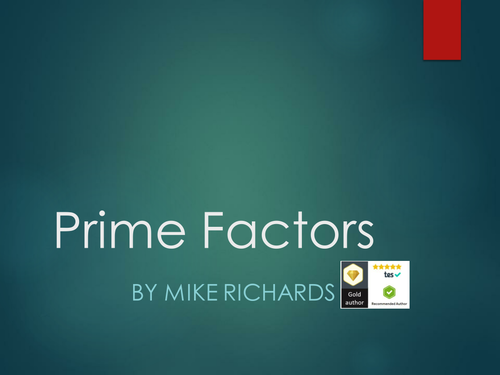






Starter:
- To perform (mental) calculations.
- To recognise prime numbers
Main Lesson:
To know and use the vocabulary of prime numbers, prime factors and composite (non-prime) numbers (Year 5)
To identify prime numbers and (prime) factors (Year 6)
To use the concepts and vocabulary of factors, prime numbers and prime factorisation (KS3)
This lesson consists of:
A Starter consisting of a series of progressively harder addition, subtraction, multiplication and division calculations and revision of highest common factors. A connect activity getting children to identify the correct and incorrect definitions of prime numbers and a second Connect to get children explain why a specific number is prime or not. .
An Interactive Whiteboard teaching introduction for both Notebook and ActivInspire, to teach how to recognise prime numbers, composite numbers and prime factors and how to use factor trees to identify the latter..
A 4-way differentiated series of tasks requiring children to identify prime numbers, composite numbers and prime factors. Answer sheet provided to support marking.
Two AFL / Next Steps tasks, introducing multistep calculations based around prime numbers and a second revising the definitions from start of lesson.
Get this resource as part of a bundle and save up to 82%
A bundle is a package of resources grouped together to teach a particular topic, or a series of lessons, in one place.
UKS2 (Year 5 and Year 6) - complete set of Maths lessons for October
15 sets of complete lessons (3 x 5 days) covering current National Curriculum expectations for teaching short and long division, multiples, common multiples, prime factors, common prime factors, BODMAS, multiplication and division by powers of 10, metric measures, conversions between metric and imperial measures, and multi-step Word Problems. Each week ends with either an investigation of Word Problems linked to the topic studied. Every lesson includes: \- a Starter based on Arithmetic and / or previous learning and a Connect Activity designed to activate the children's interest in the topic being covered that day. \- two interactive teaching presentations designed to run on either Smartboard's Interactive Whiteboard or Promethean ActivInspire software. \- a detailed 4 way differentiated lesson plan including all relevant learning objectives and AfL / next step opportunities. \- a 4 way differentiated worksheet designed to cater for the learning of virtually all children in Year 5 or Year 6 regardless of ability.
UKS2 (Y5 and Y6) - Properties of Numbers (multiples, factors and primes); Ordering calculations BODMAS, brackets, squares and cubes
A set of 5 lessons covering: \- multiples, common multiples and lowest common multiples. \- factors, common factors, highest common factor. \- prime numbers and prime factors \- solving multi-step calculations involving brackets and orders / powers. \- solving multi-step calculations including all four operations, brackets and orders / powers. Revision of: Squared and Cubed Numbers Additional PowerPoint Presentations showing: \- how to find prime factors using factor trees \- how to use BODMAS when solving multistep calculation problems.
UKS2 (Y5 and Y6) Term 1 Week 06 - Properties of Numbers (multiples, factors and primes); Ordering calculations BODMAS, brackets, squares and cubes
A set of 5 days’ lessons covering: \- multiples, common multiples and lowest common multiples. \- factors, common factors, highest common factor. \- prime numbers and prime factors \- solving multi-step calculations involving brackets and orders / powers. \- solving multi-step calculations including all four operations, brackets and orders / powers. Revision of: Squared and Cubed Numbers Additional PowerPoint Presentations showing: \- how to find prime factors using factor trees \- how to use BODMAS when solving multistep calculation problems.
Something went wrong, please try again later.
This resource hasn't been reviewed yet
To ensure quality for our reviews, only customers who have purchased this resource can review it
Report this resourceto let us know if it violates our terms and conditions.
Our customer service team will review your report and will be in touch.